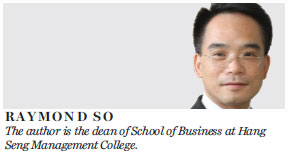Budgets are not only about 'sweeteners'
Updated: 2015-03-03 06:37
By Raymond So(HK Edition)
|
|||||||
The current system means the Budget often lacks new, much needed proposals. Because of this, the Budget doesn't receive the attention it deserves. Judging by public opinion, the focus is still on what dividends, or "sweeteners" residents will receive. People are more concerned with the number of sweeteners, such as rental relief for public housing, rate concessions, tax rebates, etc. In short, the Budget is similar to reports by listed companies offering dividends to its investors. The public now reacts to the Budget like shareholders only interested in the size of the sweeteners they will receive. Little attention is being placed on long-term economic and fiscal issues.
Hong Kong's Budget takes the form of a cash account which calculates cash flow in and out. In determining a surplus or deficit for the financial year, the approach is different from that of companies.
The so-called surplus actually means that in a financial year, cash inflows are larger than outflows. So if the government spends less than expected during a fiscal year, even though revenue remains unchanged, it will record a surplus. In the latest financial year, for example, the government budgeted for some HK$78 billion in public works expenditure. However, owing to lengthy Legislative Committee (LegCo) Finance Committee debates, the majority of these public works projects have yet to receive funding approval. This has resulted in a spending of HK$60 billion less on public works projects.
By definition, the unspent funds will become a surplus. It is not surprising that there is a large surplus this year. The key point is that apart from focusing on the surplus, there should be explanation for the reasons behind it. Even when an increase in revenue contributes to a large surplus, one should not assume this is always a good thing. Simply put: Some increases in revenue are undesirable. One example of this could be the increase in revenue due to the special stamp duties on property purchases. When the property market is active, the government's revenue from stamp duty will be large. Clearly this increase in revenue is inconsistent with the government's policy of attempting to maintain a stable property market.
I mention this to illustrate the limitations of Hong Kong's approach to its public finances, namely its lack of long-term financial commitments. At present, the public obsession with receiving sweeteners shows that society pays too little attention to the state of the government's long-term financial situation. Whenever there is a surplus, people naturally expect sweeteners.
During such circumstances, many will not be interested in the content of the Budget. This can lead to a vicious cycle: People will not be concerned about the details, only the amount of sweeteners. The government will then need to pacify the opposition by distributing more sweeteners, and so the public will subsequently expect more. The media also places too much emphasis on these payouts. More serious issues relating to public finances are therefore given insufficient attention. Hong Kong is facing the challenge of an aging population and the risk of a potential structural deficit. But unfortunately, these are not issues of widespread concern.
To change people's views on the Budget, the government needs to change the focus of the Budget. Perhaps, it would also be good to change public expectations of the Budget. The Budget is formulated to utilize financial resources for policies, so the Budget itself should remove the impression that sweeteners will always be offered. Needless to say, the current government is weak in this regard. Especially after "Occupy Central", it is clear that the government lacks public support. Political realities are forcing the government to attempt to appease the public. Hence, government policies are now aimed at trying to build public support. Sadly, budget measures are being implemented simply to pay for this.
I stressed that the Budget should be consistent with the Policy Address, so as to allocate financial resources to make economic policies more effective. If the Policy Address is formulated with a payout mindset, the Budget will become no more than a payout policy statement. To make the Budget truly effective, long-term economic plans should be properly outlined in the Policy Address. Especially, as Hong Kong now faces two major economic challenges, namely an increasingly aging population and a shortage of land. The city needs to change its attitudes in order to implement sensible economic policies to deal with these issues. After all, public finances are not about paying business dividends and governments should not act like listed companies. People should never view Budgets solely in terms of the sweeteners on offer.

(HK Edition 03/03/2015 page10)